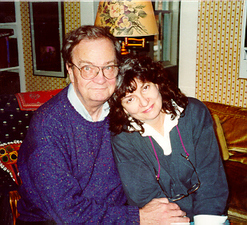Donald Hall, a former poet laureate of the United States, died on June 23, 2018. He was 89 and had lived much of his life at the old farm called Eagle Pond, his family’s ancestral homestead, in Wilmot, New hampshire.
He had been diagnosed with cancer in 1989 and beat his own odds of survival.
He began writing at age 12, and over his career wrote more than 40 books, with half of them being poetry.
He wrote often about apples, ox carts and the ordinary folk of his rural New England, along with using his childhood, baseball, and his time with and the death of his second wife, poet Jane Kenyon.
 |
| Donald & Jane |
Hall was married to Jane Kenyon for 23 years. She died in 1995. He wrote about her and their marriage in the collections Without (1998) and The Painted Bed (2002).
I recorded Donald Hall when he read and talked about two of his poems. "Old Roses"
& "Weeds and Peonies", at a teachers' conference in Boston (2009) along with Robert Bly.
& "Weeds and Peonies", at a teachers' conference in Boston (2009) along with Robert Bly.
After Jane's passing, Hall with his wild hair and beard might have been taken on the streets to be a homeless man or an eccentric professor. But he was still the poet, changed by his life experiences, but still believing that "Poetry offers works of art that are beautiful, like paintings, but there are also works of art that embody emotion and that are kind of school for feeling."
AFFIRMATION
To grow old is to lose everything.
Aging, everybody knows it.
Even when we are young,
we glimpse it sometimes, and nod our heads
when a grandfather dies.
Then we row for years on the midsummer
pond, ignorant and content. But a marriage,
that began without harm, scatters
into debris on the shore,
and a friend from school drops
cold on a rocky strand.
If a new love carries us
past middle age, our wife will die
at her strongest and most beautiful.
New women come and go. All go.
The pretty lover who announces
that she is temporary
is temporary. The bold woman,
middle-aged against our old age,
sinks under an anxiety she cannot withstand.
Another friend of decades estranges himself
in words that pollute thirty years.
Let us stifle under mud at the pond's edge
and affirm that it is fitting
and delicious to lose everything.
Donald Hall
MORE
poetryfoundation.org/poets/donald-hall
poetryfoundation.org/poets/donald-hall
theparisreview.org/interviews/2163/donald-hall-the-art-of-poetry-no-43-donald-hall




